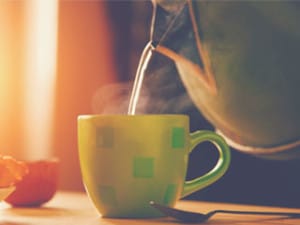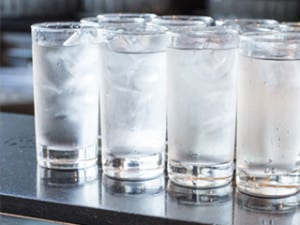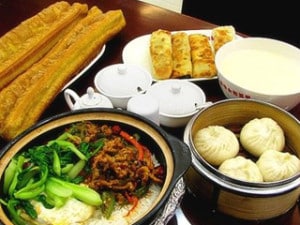 I still remember the day when I realized that the concept of “warm water” does not exist in America. On a brisk winter morning my freshman year, I stepped into Au Bon Pain and asked if I could have a cup of warm water. The waitress looked at me as if I had said those words in Chinese. “Warm water?” She asked with a frown as if combining these two words into a phrase was an idea so ludicrous that she had never thought of it before. “I can give you a cup of hot water if you want. We have iced water too,” she tried. I shook my head.
I still remember the day when I realized that the concept of “warm water” does not exist in America. On a brisk winter morning my freshman year, I stepped into Au Bon Pain and asked if I could have a cup of warm water. The waitress looked at me as if I had said those words in Chinese. “Warm water?” She asked with a frown as if combining these two words into a phrase was an idea so ludicrous that she had never thought of it before. “I can give you a cup of hot water if you want. We have iced water too,” she tried. I shook my head.
I wanted WARM water, I explained, neither too hot nor too cold. I suggested that she mix some cold and hot water for me. She nodded, still in disbelief of my request. Then she proceeded to fill a glass with ice and poured hot water into it. By the time I received the cup, the water was already cold and felt no different than tap water. And I was informed that I needed to pay $2 for the cup.
Growing up, I had often been told by my mother that “you should always drink warm water first thing in the morning.” As a child, I never questioned it and was served a cup of warm water every morning before I was given my breakfast. Only after I came to America did I realize that I should have never taken that daily cup of warm water for granted. In every restaurant I have been to in this country—whether it serves Western or Asian food—I am handed a huge glass of iced water before anything else.
There are few things that turn me off more than the sight of ice cubes floating in my water. Drinking iced water makes my stomach churn, especially in the morning. Maybe my mother’s training has altered my constitution such that my body can no longer deal with water below a certain temperature. Inevitably, I ask the waiter to replace my water with “water without ice.” (I have long ago given up on asking for “warm water”.)
After I have related my warm water struggles to my friends, I have come to realize that asking for iceless water is actually an “Asian” thing to do. Apparently, only Asians like me find chilled water distasteful. On the one hand, I was happy to find that I was not the only one who hated iced water. On the other hand, I was surprised that there was a cultural and even racial dimension to a question as innocuous as water preference.
When I mentioned to my American friend that Chinese people often heat their milk before drinking it, he cringed in disgust. Then I asked him what explains Americans’ fascination with iced water. He said, “Cold water is refreshing. Lukewarm water gives the feeling that it has been sitting in the room for a long time. It’s like the feeling when you sit on a chair and realize that it’s still warm from the butt of the last person who sat on it.” It made a little sense to me, but I was not convinced. Warm water can be fresh, too (if only Americans knew how to mix it properly).
 It is no accident that the West prefers “cold” and the East prefers “hot.” Chinese medicine comes in the form of hot concoctions, Western medicine in pills. Refrigeration was first invented in the West in the 19th century and arrived in China much later. This is a testimony to how our eating habits are deeply ingrained in our cultural backgrounds; no one is born with a preference to hot or cold drinks. But in the case of iced water, America is actually the exception not the norm. In most of Asia and even Europe, restaurants serve room-temperature water; in China, you may expect hot tea or freshly boiled water.
It is no accident that the West prefers “cold” and the East prefers “hot.” Chinese medicine comes in the form of hot concoctions, Western medicine in pills. Refrigeration was first invented in the West in the 19th century and arrived in China much later. This is a testimony to how our eating habits are deeply ingrained in our cultural backgrounds; no one is born with a preference to hot or cold drinks. But in the case of iced water, America is actually the exception not the norm. In most of Asia and even Europe, restaurants serve room-temperature water; in China, you may expect hot tea or freshly boiled water.
I have found Harvard’s dining options to be very Western-centric. If we want hot food for breakfast—simple things like scrambled eggs and sausages—we have to trek all the way to Annenberg, and we are presented with the impossible choice between food and sleep. The lack of hot breakfast in the Houses’ dining halls has been particularly frustrating for me and other international students from China.
We were brought up on the mantra that “one must eat hot food for breakfast,” and Chinese people do not generally regard cereal and sandwiches as real food. One HUDS administrator has once replied to my complaint by essentially saying “But we have oatmeal.” American oatmeal is so tasteless compared to the porridge I grew up eating that I felt like consuming it resulted in negative utility for me.
 An Ideal Chinese Breakfast
An Ideal Chinese Breakfast
On the other hand, I realize that people like me form a minority on Harvard’s campus; most American students may be fine with bagels and slices of ham and cheese for breakfast. It is at moments like this that I resign to the fact that I’m in America, not China; that a foreigner should be grateful and happy with what she has, and stop expecting the host country to be a replication of home. I remind myself that I’m lucky to be in the land of dreams, opportunities, and iced water.


